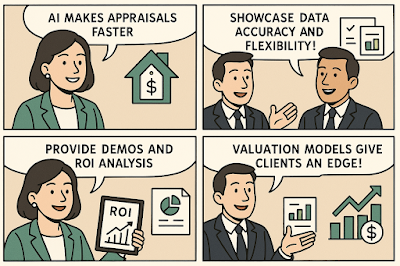How to Sell AI-Powered Real Estate Valuation Models
The real estate market is increasingly relying on data-driven insights to determine property values, forecast market trends, and inform investment decisions.
AI-powered real estate valuation models have become essential tools for agents, investors, banks, and developers looking for faster, more accurate assessments.
This guide will explain how to effectively sell these models to maximize adoption and value for clients.
Table of Contents
- Why AI Valuation Models Matter
- Key Features Clients Look For
- Sales Strategies and Best Practices
- Challenges and How to Overcome Them
- The Future of Real Estate Valuation
Why AI Valuation Models Matter
AI models process vast datasets, from market transactions and rental rates to neighborhood trends and property features.
They deliver faster, more objective, and more consistent valuations than traditional appraisals.
For clients, this means better decision-making, competitive advantage, and cost savings.
Key Features Clients Look For
Automated data collection from public records, MLS, and market feeds.
Accurate price estimates with confidence intervals.
Customizable parameters for niche markets or property types.
Integration with CRM, underwriting, or investment platforms.
Sales Strategies and Best Practices
Identify target segments—residential agents, commercial brokers, lenders, or institutional investors.
Use demo sessions and live case studies to showcase accuracy, speed, and user experience.
Provide ROI analyses showing reduced manual costs, improved deal flows, or higher client satisfaction.
Offer flexible pricing, including SaaS subscriptions, per-valuation fees, or enterprise licenses.
Challenges and How to Overcome Them
Clients may be skeptical of “black-box” AI; use explainable AI (XAI) tools to provide transparency.
Data quality varies across regions; highlight how your model handles missing or noisy data.
Ensure compliance with local appraisal regulations and standards.
The Future of Real Estate Valuation
AI models will increasingly use real-time data, geospatial analytics, and drone imagery.
Integration with virtual tours, ESG scores, and climate risk data will make valuations more holistic.
As models improve, they will help unlock new market segments like fractional ownership and tokenized real estate.
Recommended Resources
Explore these related topics:
Ensure compliance in financial transactions.
Monitor market integrity with smart tools.
Incorporate climate risk into asset valuation.
Apply AI to monitor trading activity.
Streamline compliance in real estate deals.
Keywords: real estate valuation, AI models, property analytics, PropTech, automated appraisal






